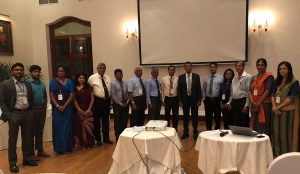
MOBILISE Director Generals’ Conference in Sri Lanka
THINKlab’s £1.2M research project MOBILISE, which is developing a digital infrastructure that can offer intelligence to a range of agencies to work together to reduce the impact of natural disasters on communities, recently held a high profile Director Generals’ Conference in Sri Lanka.
Funded by the Global Challenges Research Fund (GCRF) and The Engineering and Physical Sciences Research Council, the project focuses on Sri Lanka, Malaysia and Pakistan and is led by Prof Terrence Fernando. The objective of the event was to agree on an approach to strengthening multi-agency collaboration for disaster risk reduction.
The two-day round table conference involved senior government officials who discussed a collective way for implementing the Sendai Framework for Disaster Risk Reduction (2015-2030) priority one (Understanding Risks) and priority two (Risk Governance).
Held at the Mount Lavinia Hotel on 20 and 21 June 2018, a variety of presentations and panel sessions focused on the nature of a shared disaster risk platform a collaborative multi- agency platform that can be used for building resilient communities in disaster-prone areas, as well as on joint approaches for risk modelling, assessment, mitigation, preparation and response.
Designed as a team building exercise, the first day welcomed senior officials and project partners. Prof Terrence Fernando summarised the project and discussed the aims and objectives, as well as the challenges faced by the three low-middle-income countries.
Day two opened with a discussion on Understanding Disaster Risks with the aim of defining the nature of a multi-agency shared platform for capturing and establishing a common understanding of disaster risks. Prof Fernando presented ideas for creating such a digital platform to capture risk information (one which can establish a mutual understanding of risks and possible interventions for mitigation).
A presentation on a pilot case study was given (set in Kaduwela, Sri Lanka) followed by a discussion on the best ways to establish and prove the feasibility of a multi-agency shared platform in a chosen location.
The final session, Risk Governance, analysed collaborative risk assessment, mitigation, preparation and response using the shared platform. A business scenario was used to present the challenges, possible solutions and value and also the key stakeholders that could install the platform along with the required KPIs. The presentation concluded by looking at a six-step risk assessment currently used in New Zealand, Australia and the UK.
The successful event culminated with a unanimous agreement regarding the importance of collaboration and a stated willingness to support the MOBILISE team with developing an advanced digital approach for Sri Lankan disaster risk reduction.
The project team is very grateful to everyone who came together and agreed to support the MOBILISE project in the future. A similar activity will take place in Kuala Lumpur in October 2018 to initiate a collaborative approach for disaster risk reduction in Malaysia.
To understand more about the event and read the full summary, click here.




Recent Comments